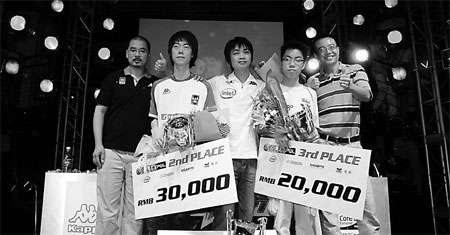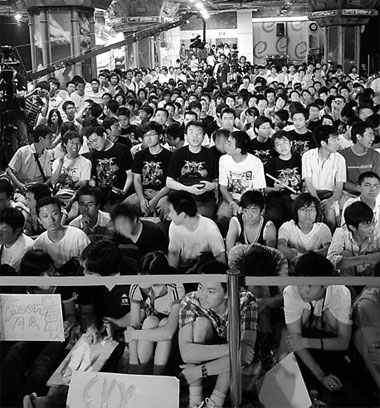Game on
 |
| Li Xiaofeng (middle) poses with the second and third prize winners and representatives of organizers, after winning the PGL tournament held this year in Beijing |
"I am a professional gamer, I will represent China to play in the World Cyber Games held in your country in this October," replied the young man.
The visa officer looked up in curiosity and checked the previous entrance stamps from other foreign countries, and after a short pause, added one more stamp to the passport.
The young man, named Li Xiaofeng, who is also known as "Sky", is one of the most famous of China's 13 million electronic sports lovers.
Li is the first back-to-back World Cyber Games champion of Warcraft, a popular real-time strategy game. It has earned him a spot in the World Cyber Games "Hall of Fame".
Behind his success, electronic sports, a prosperous new industry that still exists outside of Chinese mainstream culture, is booming.
 |
|
E-sports lovers gather to watch a competition held in Beijing. File Photos |
Before winning his first world title, Li was already widely known among Chinese E-sports lovers. He is worshiped as "Emperor of Human" for his ability to control human troops against Warcraft's other three races: the Orcs, the Undead and the Night elves.
Li's aggressive tactics have won the hearts of Warcraft lovers. In the real world, his journey from poor student at a technical secondary school in Central China's Henan Province to E-sports super star has also won him popularity.
Despite Li's hard work to get where he is, it is the sudden growth of the industry that has enabled him to win prizes such as the $20,000 from his last championship.
E-sports started to generate buzz in China from 1999 when major games like Starcraft and Counter-Strike became popular. The industry has developed exponentially since then, aided by the country's 50 million netizens and countless Internet cafes.
With the widespread introduction of broadband, millions are now playing cyber games and understand what E-sports are. Magazines, newspapers and websites play an important role in promoting the games, while two digital TV channels broadcast E-sports round the clock.
The industry chain includes professional players, clubs, tournaments organizers, media and sponsors. But like other emerging industries, it does face its challenges.
"Because the industry is still searching for a stable and profitable business model, we rely on our sponsors," says Li Jie, CEO of WNV Teamwork Digital Entertainment Technology, one of the country's top E-sports clubs.
Unlike most of his classmates, Li Jie didn't choose to work in a telecommunication company after graduating from Beijing University of Posts and Telecommunications in 2003. Inspired by his friend, an Internet cafe owner who attracted customers by holding a game tournament, Li Jie launched his own club.
The company's main income comes from prize money won by its pro-gamers at various tournaments, advertising dollars and sales of club merchandise.
After his Counter-Strike team won the first championship for Chinese E-sports, he secured his first investment to start the club with.
This year, a domestic PC accessory producer invested 2 million yuan ($262,800) into the company. Li Jie says he is confident of returning his new investor a handsome profit.
WNV represents almost all of the top E-sports teams for major games such as Warcraft, Counter-Strike (a shooting game), FIFA World Cup (football) and Need for Speed (car racing). Between tournaments, the pro-gamers practice from 2 pm to 10 pm every night.
It is estimated that there are 200 E-sports clubs in the country employing 10,000 professional gamers aged between 18 and 25.
"I am able to pay each of my players about 7,000 yuan ($920) a month now," Li Jie says. "They have insurance and welfare as well."
However, few clubs enjoy WNV's success and most pro-gamers earn only 500 yuan ($66) a month.
Li Jie says that becoming a pro isn't easy, and even with training, patience and sound reflexes, not every game lover has the ability to be a great player. His company recently moved to a new site - a 500 sq-m office space in downtown Beijing. The new address doubles as the company's headquarters and training ground for the gamers.
"After the Beijing Olympic Games, China will need new concepts to boost its economy," Li Jie says.
He believes E-sports will become an important cog in the growing creative industry machine.
You Yang, 26, is the marketing manager of China E-sports Interactive Technology & Development, which currently runs the ProGame League (PGL). Launched in 2006, it has become one of the most influential of its kind in the world.
Graduating with a business management degree in 2005, You worked as an editor at an E-sports magazine before joining PGL.
"Firstly, I liked playing games as do most young men of my age. Then this new industry comes along that can provide me with a real shot at success," You says.
He is paid around 6,000 yuan ($788) a month, a competitive salary compared to his classmates who work in traditional industries.
The PGL has held five tournaments around China, attracting amateur E-sports fans and professional players. The tournament's profits come from telecast fees and product placements from global companies like Inter and Kappa. According to a report from the company, during 2007 Warcraft Season One, the live audience reached a peak of 345,300.
Wang Manjiang, 40, CEO of PGL, used to manage a famous professional football club in Dalian, Northeast China's Liaoning Province. He is confident of making it a top Chinese E-sport brand.
"This new industry is a great combination of technology and sports," Wang says. "I hope the PGL will become a successful sports entertainment brand like the NBA."
Last month Li Xiaofeng failed to defend his title at the World Cyber Games held in the United States. For the country's E-sports industry, however, the game has just begun.
(China Daily 11/16/2007 page20)














